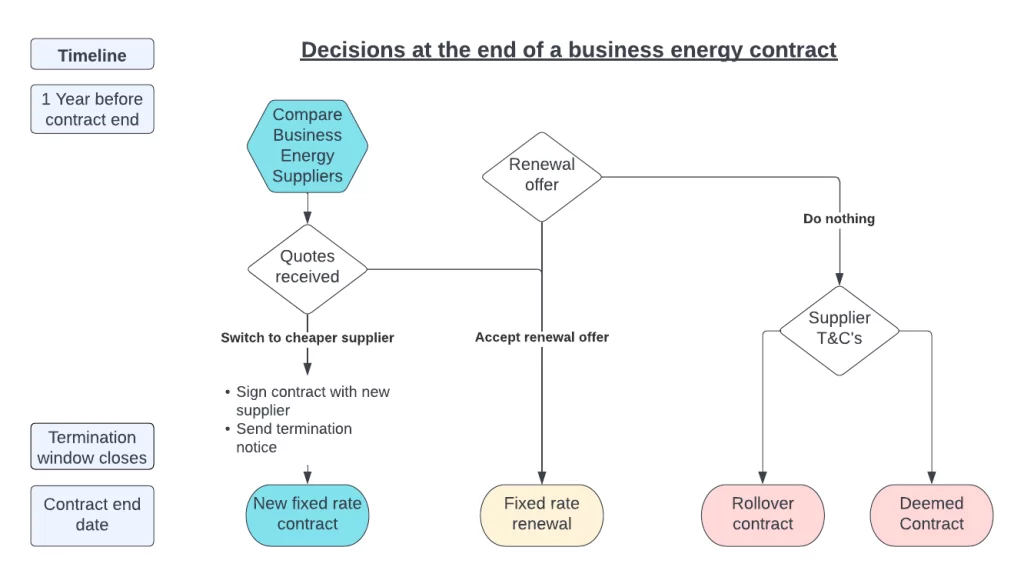A complete guide to business energy contracts
Business energy contracts are legally binding agreements with a licensed energy supplier to supply electricity or gas to a commercial property.
In this guide, we answer all the key questions about how business energy contracts work. Here’s what we cover:
- Types of business energy contracts
- Key elements of business energy contracts
- Business energy contract timeline
- Options at the end of a business energy contract
- The format of business energy contracts
Types of business energy contracts
Here, we present the most common types of business energy contracts used by SMEs in Britain.
💡 Large organisations use more complex procurement strategies; visit our large business energy page for more information.
Fixed-rate business energy contract
A fixed-rate tariff is the most popular option for small business energy customers, where a business pays a fixed unit cost plus a daily standing charge.
Monthly bills vary over the year depending on your energy usage, but the unit rate per kWh of energy consumed remains fixed. Fixed-rate contracts allow businesses to forecast energy costs more easily.
Fixed tariffs typically include expensive termination fees for cancelling a business energy contract early.
Variable rate business energy contract
A variable rate business energy tariff is often described as a “freedom” or “flexible” tariff. There is no fixed contract period, and customers can switch to another tariff at any time.
In a variable rate tariff, the amount you pay per kWh regularly changes to reflect current wholesale market conditions.
Commercial electricity and business gas suppliers typically use the variable rate tariff as their default contract when a fixed tariff ends.
Multi-rate business energy contract
Sometimes also known as the Economy 7/10 tariff or a time-of-use contract, a multi-rate contract allows businesses to pay different unit rates for energy used at “peak” and “off-peak” times.
In a multi-rate business energy contract, businesses benefit from lower business energy rates during the night when there is less demand for energy.
To take advantage of a multi-rate business energy tariff, you’ll need a half-hourly meter, a dual-rate meter, or a smart business energy meter.
Key elements of business energy contracts
Business energy contracts are typically many pages long, incorporating the supplier’s standard terms and conditions.
Our experts have distilled the key details included in a business energy contract:
- Your registered business name
- Your company registration number (if LTD)
- Your registered business address
- The supply address
- The full name, home address, and date of birth (DOB) of the person responsible for the contract. (This isn’t always requested, but most suppliers require this information, even for limited companies.)
- Your agreed business energy tariff costs, including unit rates and standing charges.
- Incorporation of business energy broker commission rates (if applicable).
- The contract term in years
- Your direct debit collection date
- The total estimated annual cost of the contract
- The terms and conditions of the contract including fees for early termination, requirements for securing your ability to pay, the supplier’s ability to stop your supply, and more.
Business energy contract timeline
In the final year of a business energy contract, there are several key dates that should be considered when making decisions about what will happen after the contract ends.
Here’s a diagram of the basic timeline outlining the key dates at the end of a business energy contract:

Getting the timing right at the end of your business energy contract is critical. We recommend putting the following important dates in your calendar:
One year before the contract end date
Twelve months before the end of a business energy contract, you’ll be able to get quotes from alternative suppliers and arrange a new contract, either with your current supplier or an alternative business energy supplier.
Termination window close date
If you want to switch business energy suppliers, you must give a certain amount of notice before the end of the contract. The notice you need to give depends on your specific contract but is typically between 30 and 120 days.
This date is a deadline for avoiding an unfavourable rollover or default variable contract rates.
Contract end date
All fixed business energy contracts include an end date when your business gas or electricity supplier ceases to provide energy at the agreed per kWh unit rate and daily standing charge.
If you don’t know your contract end date or the termination notice deadline, we recommend contacting the customer services department of your business energy supplier.
Options at the end of a business energy contract
Three different outcomes can occur when a business energy contract ends. In this section, we’ll explore the pros and cons of each of these outcomes:
- Do nothing and continue to be supplied under a default business energy rates
- Accept the renewal terms offered by your business energy supplier
- Switch to a contract being offered by an alternative supplier
Do nothing and continue to be supplied under a deemed business energy contract
This is the easiest option from an administrative perspective but often results in paying needlessly expensive business electricity prices or commercial gas rates.
Within your current business energy contract, there will be a clause that explains what happens if you reach your termination window and fail to make arrangements for your supply.
Typically, one of two things will happen at the contract end date:
- Rollover Contract – You’ll automatically be contracted for a further fixed term of one year at a standing charge and rate per kWh determined by your current business energy supplier. You won’t be able to switch to a more favourable agreement until the end date of the rollover business energy contract.
- Standard Variable Contract – You’ll continue to pay your business electricity supplier at a variable rate determined by the current wholesale energy market. The business energy rates you pay will go up and down with the market. You can switch to another supplier or tariff at any time during a standard variable contract.
Accept the renewal terms offered by your business energy supplier
Your current business electricity or business gas supplier will send out an offer of renewal rates when your current contract approaches its end.
The timing of the renewal offer depends on your supplier. The renewal offer will typically come in the form of a fixed-rate business energy tariff:
- A term between 1 and 3 years.
- A fixed daily business standing charge.
- A fixed unit price of electricity or gas per kWh.
If you accept the renewal terms offered by your supplier, your new contract will automatically commence on the contract end date of your current tariff.
Switch to a contract being offered by an alternative supplier
The business electricity and gas supply market is highly competitive, with many suppliers striving to offer the best prices.
To encourage competition within the business energy market, Ofgem (the regulator) ensures that switching between suppliers is simple.
In the final year of your current contract, before your termination window closes, you can arrange to switch business energy suppliers from your contract end date.
Here’s how to do it:
i. Collect quotes from across the market with a comparison service
To get the best prices, it’s important to compare as many business energy suppliers as possible. Using a service to compare business energy prices makes this process as easy as possible.
With a few details about your property and contract, a comparison service will provide you with fixed-rate quotes. You can compare these quotes against the renewal offer to see if you can save money by switching suppliers.
ii. Make a hassle-free business energy switch
If you decide to take advantage of one of our quotes, we’ll handle a hassle-free switch to a new business energy supplier.
We’ll help you through each stage of the process:
- Signing a fixed-rate contract with your new supplier
- Providing a termination notice to your current supplier
Here’s our full guide to the process of switching business energy suppliers.
The format of business energy contracts
Businesses can agree to a business energy contract verbally, through a digital signature, or via a wet signature.
We explain the three formats of legally binding business energy contracts.
Paper contract
A paper contract is an agreement provided by your energy broker (a third-party intermediary) or directly from your business energy supplier as a hard copy of the contract.
This contract will include all the terms and conditions you agreed to with the energy supplier.
As there is no cooling-off period for a business energy contract, ensure you read it thoroughly and understand all terms before signing.
Once you have hand-signed this document, we recommend retaining a copy for your records and returning it to your broker or supplier as quickly as possible to ensure the contract remains valid.
This is because energy prices constantly change, and the contract may become invalid if there is a significant change in the market.
We also recommend scanning a copy of this contract and emailing it back to your supplier or broker to ensure you don’t miss out on the agreed-upon prices.
Digital contract
A digital contract is a soft copy of the agreement provided by your broker or business energy supplier via a digital platform that is emailed to you.
The platform will trace your IP address and allow you to sign the document digitally. Once signed, it will automatically return to your broker or business energy supplier, who will be notified by the platform that you have completed the process.
After signing, you will receive a copy of the signed contract. Remember to keep this for your records in case you have any queries or complaints.
Verbal contract
Many brokers and business energy suppliers prefer to establish verbal contracts while you are on the phone. These contracts are legally binding, even if you do not receive a written copy or a conversation recording.
Verbal contracts can take around 20 minutes to complete, and it is easy to miss some details during the call. Therefore, listening carefully to everything being said before confirming your agreement is essential.
The caller will read from a script, and they must recite the contract verbatim. This script includes all the information you typically receive in a soft or hard contract copy.
When listening to the verbal script, we recommend paying close attention to:
- The business energy rates totals
- The business energy standing charges
- The contract terms
We also recommend requesting an email with a copy of your verbal agreement. This ensures you have a record of the contract and the agreed-upon terms. Brokers and business energy suppliers are only required to keep a copy of the agreement for one year, so having your own copy is essential if you need to dispute the contract.
Additionally, request that all documents, including the terms and conditions, be sent to you in a soft copy for future reference.

